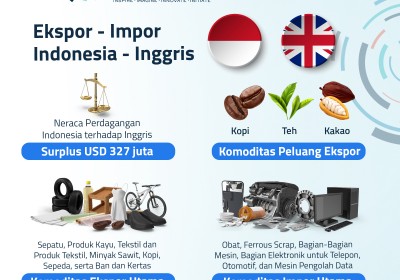Kemendag Eyes Increase of Coffee, Tea and Cacao Exports to Post-Brexit UK
March 04, 2021
JAKARTA – In the midst of the Covid-19 pandemic as well as post-Brexit conditions, Indonesia’s Trade Ministry (Kemendag) hopes that the country’s coffee, tea and cocoa sellers continue to trade with the United Kingdom due to the fact that these commodities saw their consumption rates soar globally during the pandemic.
In 2020, total trade between Indonesia and the UK reached US$2.23 billion, with US$1.28 billion in Indonesian exports to the UK and US$956.39 million in UK imports to Indonesia, resulting in a trade surplus of US$327 million.
Indonesia mainly exports shoes, timber, textiles, palm oil, coffee, bicycles, tyres and paper to the UK, while the UK mainly sends pharmaceuticals, ferrous scrap, machinery parts, electronic components for phones, vehicles and data processing machines.
Kemendag’s director general for national export development, Kasan said that despite the large opportunity presented to coffee, tea and cacao sellers, Indonesia faces several challenges when trading with the UK.
“Aside from challenges related to tariffs, other aspects that the sellers must consider include the product’s sustainability, environmental friendliness and the philosophy behind the product itself,” Kasan said at the ‘Post-Brexit Strategies To Increase Exports of Coffee, Tea and Cocoa to the UK’ virtual business conference on Thursday (18/2).
Other challenges that coffee, tea and cocoa sellers face, according to Kasan, include greater efforts to ensure the products meet the UK’s food safety standards, food contaminant limits and labeling/packaging issues.
To be eligible for export to the UK, each product faces its own challenges. Indonesian coffee sellers, for one must fulfill the UK’s fair trade, sustainability, traceability and organic standards. The challenge for tea exports is to reduce the amount of antraquinone present in Indonesian tea leaves, which still go beyond the UK’s limit of 0.02 mg per kg. Similarly, Indonesian cocoa sellers must also make sure their products do not have a cadmium composition that exceeds 0.05ppm.
Indonesia’s ambassador to the UK Desra Percaya underlined that post-Brexit trade regulations, and its continual fallout, presents a big challenge to Indonesian exporters. “This challenge must be viewed as an opportunity for us to show we are able to meet their new requirements properly. Every effort in adjusting to this transition must be effectively monitored, managed and taken advantage of for the good of our economy,” he said.
Desra added that the UK is currently planning to implement new due diligence policies for 7 key commodities (soybeans, palm oil, timber, pulp and paper, leather, meat, rubber and cocoa) to make sure that the supply chains of these goods do not contribute to deforestation.
“There needs to be effective communication and partnership between the government and the relevant businesses to properly meet the UK’s export criteria from the very start, so that Indonesian exports would not run into problems during the due diligence phase or any of the non-tariff phases,” Desra explained.
Kemendag’s director for export product development Olvy Adrianita elaborated that Kemendag will continue to provide support for Indonesia’s coffee, tea and cacao industries to fulfill their potential in the UK. “One of the ways we will do so is to make it easier for businesses in these industries to obtain the relevant certification and meet the standards required,” Olvy explained.
Send us your great ideas relating to how Indonesia can innovate its development efforts through Indonesia Development Forum’s social media pages!
Indonesia’s Research Institutions Supporting the Development of the Electric Vehicle Industry
Indonesian Muslim Fashion and Cosmetics IKMs Shine at Dubai World Expo 2020
Govt Steps Up UMKM Transformation Efforts in the Midst of Pandemic Slowdown
Govt Encourages Promotion of IKM Products in Digital Era
Government Begins Developing Maritime Training Center in Makassar
Tweets by IDDevForum
